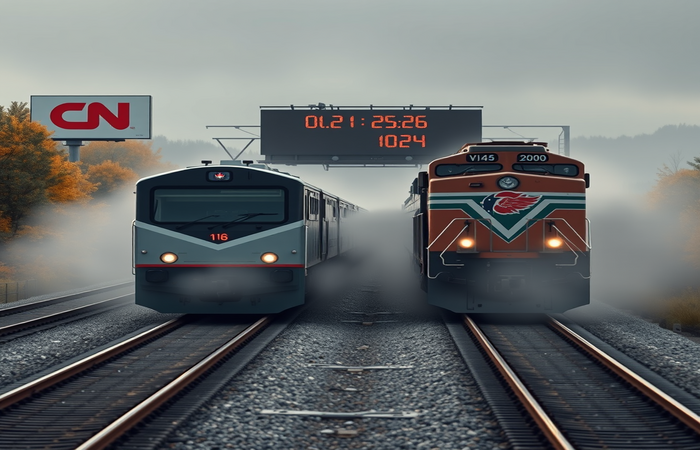GoVolta’s Rail Revolution: Funding Failure, or Future Fix?

This article analyzes the recent setbacks faced by GoVolta, a Dutch start-up aiming to revolutionize budget international train travel within Europe. GoVolta’s ambitious plan to offer affordable daytime train services between Amsterdam and key European cities like Berlin, Copenhagen, and Basel, with tickets priced at a remarkably low €10, has hit a significant roadblock. The company’s failure to secure crucial financing from Rabobank, a major Dutch lender, has forced a postponement of its launch and the relinquishment of allocated track access rights. This situation highlights the complexities inherent in launching a new railway operation, particularly the challenges of securing funding, navigating regulatory hurdles, and managing contractual relationships with suppliers. The following sections delve deeper into the financial aspects, operational challenges, and broader implications of GoVolta’s experience, providing a critical examination of the factors contributing to its current predicament and the potential lessons for future entrants into the European railway market.
Securing Financing in the Railway Industry
GoVolta’s inability to secure the necessary €7 million (approximately $9.08 million USD) loan from Rabobank for rolling stock acquisition underscores the significant financial hurdles faced by new entrants in the railway sector. The inherently capital-intensive nature of railway operations necessitates substantial upfront investment in rolling stock (locomotives and passenger carriages), infrastructure, and operational resources. Securing this funding requires a robust business plan demonstrating financial viability, a clear understanding of market demand, and a credible management team. GoVolta’s experience highlights the importance of thorough due diligence by lenders, who often prioritize minimizing risk by demanding stringent financial projections and collateral. The eight-month review process undertaken by Rabobank, despite initial engagement, underscores the rigorous evaluation process involved in assessing the creditworthiness of such projects.
Operational Challenges and Regulatory Hurdles
Beyond the financial difficulties, GoVolta also encountered operational challenges, including disputes with subcontractors and the complex process of obtaining the necessary train operating licenses. These issues, while not directly responsible for the financing failure, likely contributed to Rabobank’s concerns about the overall project feasibility. The regulatory landscape for railway operations is notoriously complex, demanding adherence to strict safety standards, operational regulations, and timetable coordination with existing rail networks. Successfully navigating this regulatory environment requires specialized expertise and substantial resources, which can add significant cost and time delays to the project lifecycle. Delays in securing licenses and resolving subcontractor disputes further eroded GoVolta’s chances of securing a loan.
The Importance of Market Research and Revenue Projections
GoVolta’s initial success in pre-selling 70% of tickets at €10, while seemingly promising, may not have fully reflected the operational realities of running a viable railway service. While this demonstrated strong initial demand, it may not have translated into a sustainable long-term business model. The price point, while attractive to consumers, needed to be carefully analyzed against the costs of operation, maintenance, and infrastructure usage. A more thorough cost-benefit analysis, incorporating potential risks and uncertainties, would have likely strengthened GoVolta’s application for funding. Moreover, the potential impact of unforeseen external factors such as economic downturns or shifts in consumer travel preferences should have been factored into their projections.
The Future of Budget Rail Travel in Europe
GoVolta’s experience, though disappointing, provides valuable insights into the challenges and opportunities presented by the European rail market. The demand for affordable, high-speed rail travel is undeniable, and innovative business models are needed to make this a reality. However, the financial hurdles, regulatory complexities, and operational challenges are significant and require careful planning and execution. Future entrants should prioritize a comprehensive understanding of the market, secure robust funding based on realistic financial projections, and navigate the regulatory landscape effectively. The success of GoVolta’s locomotive leasing venture, while not replacing their initial ambition, may offer a viable alternative pathway to profitability, allowing them to accumulate experience and build a more sustainable foundation for future growth. The company’s setbacks should serve as a cautionary tale, highlighting the need for meticulous financial planning, robust risk management, and a thorough understanding of the unique challenges facing the railway industry.
Conclusions
GoVolta’s delayed launch serves as a stark reminder of the complexities involved in establishing a new railway operation. The failure to secure a crucial loan from Rabobank, due to perceived high risk, exposed the critical need for comprehensive financial planning and robust risk mitigation strategies within the railway industry. This case study highlights several key factors for success. First, securing sufficient funding is paramount. The capital-intensive nature of railway infrastructure and rolling stock demands extensive upfront investment, requiring meticulous financial projections and a strong business plan to convince lenders. GoVolta’s initial success in pre-selling tickets, while positive, did not fully offset the risk perceived by the bank. Second, effective navigation of the regulatory landscape is essential. Obtaining the necessary operating licenses and adhering to stringent safety regulations requires significant expertise and resources. Third, robust operational planning is critical. GoVolta’s disputes with subcontractors highlight the need for carefully managed contracts and reliable supply chains. Finally, realistic market research and revenue projections are vital. GoVolta’s ambitious pricing strategy may have underestimated operating costs. Future railway startups should learn from GoVolta’s experience by focusing on securing solid financial backing, developing detailed operational plans, navigating regulatory hurdles effectively, and utilizing realistic market analysis for sustainable growth. While GoVolta’s immediate plans are on hold, its continued success in locomotive leasing could pave the way for a future return to their original vision, but only with a more realistic and well-funded approach.



